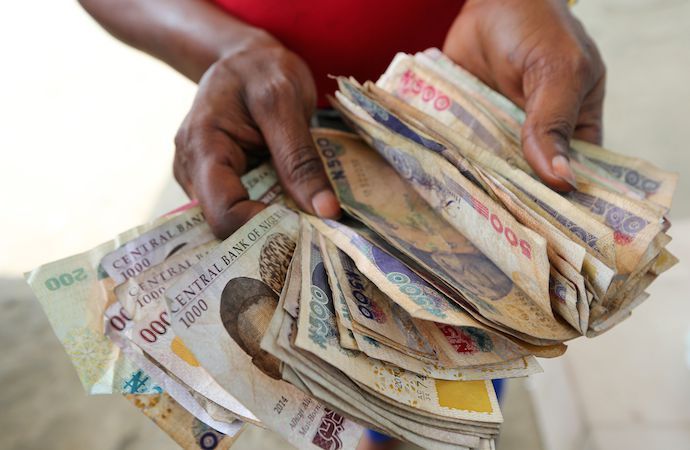

The naira remained under pressure across official and parallel markets despite continuing increase in Nigeria’s foreign exchange (forex) reserves.
The naira depreciated by 0.2 per cent at the official Investors and Exporters (I & E) Window and fell further by 0.5 per cent at the parallel market. Nigeria’s forex reserves, meanwhile, rose for the second consecutive week to close at $39.87 billion, an increase of $25.56 billion.
The naira depreciated N416.67 per dollar at the I & E Window as turnover on the official window declined by more than 20 per cent. At the parallel market, the naira declined to N577.00 per dollar, as large unmet demand continued to sustain wide gap between the official and parallel rates.
Most analysts said they expected the nation’s currency to remain under pressure despite the steep rise in crude oil price.
Analysts at Cowry Asset Management said they expected “sustained pressure at the I & E FX Window as the markets react to strain in forex supply despite higher crude oil prices at the international market as production output remains low”.
Cordros Capital noted that while the Central Bank of Nigeria (CBN) has enough supply to support the forex market over the short term, the naira may depreciate further in the medium to long-term as the market adjusts to market realities.
According to analysts, foreign inflows, which have dwindled in recent period, are paramount for sustained forex liquidity over the medium term, “in line with expectation that accretion to the reserves will be weak given that crude oil production levels remain pretty low”.
value and flexibility in the exchange rate would be significant in attracting foreign inflows back to the market,” Cordros Capital stated.
With global crude oil price above $110 per barrel, most analysts agreed Nigeria remained disadvantaged. Nigeria’s oil sector continues to grapple with low crude oil production in line with challenges facing the sector.
According to OPEC’s Monthly Oil Market Report (MOMR), Nigeria’s crude oil production, excluding condensates, averaged 1.40mb/d in January 2022 as against 1.32mb/d last month, 16.7 per cent below OPEC+ production agreement of 1.68mb/d for the month.
Analysts at Cordros Capital outlined that the major factors responsible for the low performance of the oil sector included the difficulties in restarting the oil wells for operation after the COVID-19 induced shutdown and infrastructure decay.
Other factors militating against the oil sector included divestments given the challenging business environment amidst companies’ move to cleaner energy sources and oil thefts.
“Overall, we do not expect a significant improvement in crude oil production over the short term, given the nature of challenges hampering production. Accordingly, we expect the government’s oil revenue performance to be underwhelming over the short term despite the rally in crude oil prices,” Cordros Capital stated.
Veteran Nigerian singer Innocent Idibia, popularly known as 2Baba (or 2face), has reunited with his…
A fully loaded truck with registration number GGE 624 YJ lost control and plunged off…
Stephen Ifeanyichukwu Ejezie, a former quality assurance specialist at Access Bank’s contact centre in Oniru,…
The remains of Hon. Ijigah Okoh, former Chairman of Ogbadibo Local Government Council, have been…
Popular Nigerian TikToker known as 'Disturbing,' who actively participated in the 'Justice for Mohbad' movement,…
Justice Dehinde Dipeolu of the Federal High Court in Lagos has ordered the final forfeiture…